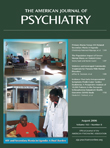Cost-Effectiveness of a Primary Care Treatment Program for Depression in Low-Income Women in Santiago, Chile
Abstract
Objective: The authors compared the incremental cost-effectiveness of a stepped-care, multicomponent program with usual care for the treatment of depressed women in primary care in Santiago, Chile. Method: A cost-effectiveness study was conducted of a previous randomized controlled trial involving 240 eligible women with DSM-IV major depression who were selected from a consecutive sample of adult women attending primary care clinics. The patients were randomly allocated to usual care or a multicomponent stepped-care program led by a nonmedical health care worker. Depression-free days and health care costs derived from local sources were assessed after 3 and 6 months. A health service perspective was used in the economic analysis. Results: Complete data were determined for 80% of the randomly assigned patients. After we adjusted for initial severity, women receiving the stepped-care program had a mean of 50 additional depression-free days over 6 months relative to patients allocated to usual care. The stepped-care program was marginally more expensive than usual care (an extra 216 Chilean pesos per depression-free day). There was a 90% probability that the incremental cost of obtaining an extra depression-free day with the intervention would not exceed 300 pesos ($1.04 U.S.). Conclusions: The stepped-care program was significantly more effective and marginally more expensive than usual care for the treatment of depressed women in primary care. Small investments to improve depression appear to yield larger gains in poorer environments. Simple and inexpensive treatment programs tested in developing countries might provide good study models for developed countries.



